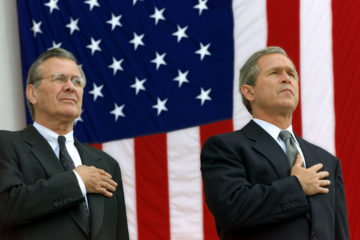The massacre in eastern Ghouta last week furnishes us with yet another example that the United Nations, in its current form, is unfit for purpose. The problem is not the UN’s intentions or its philosophy or its management, but its structure.
The UN Security Council, says the UN website, has “primary responsibility” for the “maintenance of international peace and security”. Its role is to respond to crises around the world quickly and decisively, to minimise human suffering and restore peace. This is its mission statement.
So how, then, did Russia justify delaying a UN ceasefire in eastern Ghouta? Ostensibly, its refusal to endorse the bombing suspension was based on concerns that a ceasefire would prevent action against groups such as the Islamic State and the Nusra Front. Over five-hundred civilians were killed in the bombardment, many of them children, as a consequence of Russia’s delaying tactics. Doctors had to resort to using out-of-date medicine to treat the wounded, and at least six hospitals were targeted. By blocking the implementation of a UN ceasefire and the delivery of humanitarian aid for several days, there can be no doubt that Russia failed – no, refused – to meet its responsibilities as a member of the Security Council.
This is hardly the first time Russia has flagrantly abused its position. Already, it has vetoed ten UN resolutions on Syria, thus protecting President Assad from investigations into his illegal use of chemical weapons and from broader UN collective action in defence of human rights. Russia is using its place in the Security Council in pursuit of its own narrow self-interest, offering Assad support in exchange for the use of Syria’s Tartus port, rather than being consistent with the mission statement of the organisation.
It may reasonably be objected that every permanent Security Council member uses its position in its own self-interest. The United States, for example, defied the vast majority of states and the fourteen other Security Council members in deciding to move its embassy from Tel Aviv to Jerusalem. But, none abuse their position quite so flagrantly as Russia, nor at such a devastating human cost.
This is not a novel interpretation. Nobody is under any illusions that Russia is always a law-abiding, benign member of the Security Council determined to use its position for the greater good. The problem, therefore, is not a lack of awareness, or even a lack of will to deal with Russia. The problem is that the UN was designed to protect its permanent Security Council members from being held accountable for their actions by the wider community of states.
The UN Charter, essentially its constitution, contains no mechanism at all for removing or replacing a permanent member of the Security Council. Article 23 states that China, France, the USSR (now Russia), the UK and the US “shall be permanent members of the Security Council”, but it offers no guidance as to how to replace them. The permanent members of the Security Council were selected simply because they emerged as the victors from the Second World War, and increasingly this configuration fails to represent the genuine structure of the contemporary world order. This was an absurd oversight on the part of the framers of the document: in the realm of international relations, the relative power and influence of states are bound to change. To assign any state such an important position in perpetuity is patently wrong.
It is technically not impossible to remove a permanent Security Council member from their position. There appears to be two, very difficult, methods for achieving that objective. Firstly, the UN Charter, specifically Article 23, could itself be amended, to take away Russia’s permanent seat and to assign it to someone else. However, amending the UN Charter requires the ratification of two-thirds of the General Assembly (the ‘easy’ part) and the unanimous consent of the permanent members of the Security Council. In other words, Russia would have to vote itself off the Council if it were to be removed.
Alternatively, the UN Charter could be amended so as to include a specific process for removing or adding a Security Council member; one that, perhaps, did not require the unanimous consent of every permanent member. But, Russia would still surely veto such a proposed amendment for its implied threat. As, for that matter, would the other permanent members. It just does not seem likely that they would willingly make it easier for themselves to be replaced.
In other words, the chances of Russia being removed from the Security Council against its will are non-existent. This means that it can use that position however it chooses, unrestrained and unaccountable. It can continue to back dictators who massacre civilians or harass and invade its neighbours. The UN can do nothing to stop it from abusing its Security Council position.
This poses serious questions about the future viability of the UN. Whether states should or would try to remove Russia from its position if they had the power to do so is, of course, debatable. Would Britain and France want to set the precedent that a permanent member can be removed, given that they will soon be dwarfed by non-members such as India? Would the US want to risk a confrontation with another nuclear state over the lives of a few hundred civilians in eastern Ghouta? Perhaps not. But, if the UN seriously claims to be a body that promotes the sovereign equality of nations, states must at least have the right to ask those questions. The Security Council should be accountable to the broader community of states, or else it will never be compelled to defend their interests.
The massacre in eastern Ghouta has provoked outrage and condemnation of both Syria and Russia, but that is not enough. It is time to start challenging the UN structure that permits Russia to act with the freedom that it does, or else the tragedy of Ghouta will only be repeated.


